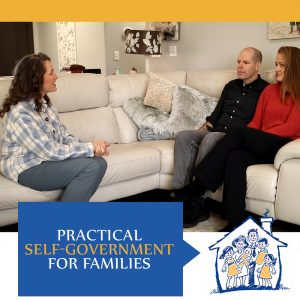Mixed Messages About Anxiety & Fragility
The subject of anxiety can be confusing. Anxiety seems to be part of everyday conversation these days. I’ve heard some people shake their heads and call anxiety a “contagious, modern epidemic,” and yet I’ve seen many real, intense anxiety attacks that leave people worn out and hopeless. Some people say that anxiety is something a person can’t overcome, yet I see people, including myself, not give in to anxiety all the time.
Anxiety is real and can be hard to handle sometimes. But, are we using anxiety as an excuse not step out of our comfort zones, thereby encouraging fragility? Who is at risk for anxiety? And, what can we do to lovingly help someone not become fragile or debilitated by their anxiety episodes?
Who Is At Risk For Anxiety?
Everyone is at risk for anxiety, but especially children because their brains aren’t fully developed, which makes them less able to solve their own problems. If everyone experiences anxiety, then why does it seem like we’re having a harder time with anxiety than ever before?
Problems are more pronounced when they are labeled. Nowadays we label anxiety and every other processing difficulty. Our society loves putting people into boxes based on what they think, feel, believe, desire, how they process, or their emotions. The term anxiety is a very common box we put others and ourselves into.
We all experience excitement, stress, fear of the unknown, or lack of knowledge sometimes. Anxiety is less of a diagnosis and more of a moment to get through when it’s called butterflies, nervousness, and stress or concern instead of anxiety. Since overcoming anxiety is common, let’s not use anxiety as an excuse; let’s think of it as an opportunity to step out, overcome, and grow.
It was 1992. My teenage heart seemed to be pounding extra loudly in my chest, my breathing was quicker, my thoughts were racing. What was my line again? I couldn’t remember. It was almost time to go on stage and I wasn’t sure I would even remember my cue. At this point a fellow actor asked me, “Do you ever get nervous before you go on stage?”
This question brought me back to reality. I took a deep breath and responded with, “Yes, I guess I do. I seem to be having some butterflies right now, in fact.”
I was having butterflies, also known as anxiety, but I knew I had to go on that stage and take action despite my anxiety. Long ago I made taking a deep breath and a leap of faith my go-tos for butterflies and anxiety.
After countless plays and singing and speaking opportunities, I don’t get stage anxiety very often, but it occasionally still happens. A few times, when I was young, I completely shut down because of the anxiety, but I eventually learned how to keep going and get myself to calm down and focus.
Playing piano in public was and still is my scariest action to perform. At multiple piano recitals and performances, my brain shut down completely. I didn’t know what line I was on, what the notes were, or where my hands were supposed to go. I really didn’t know. I was overtaken with anxiety. It’s awfully embarrassing to sit at a piano in silence in the middle of a song with people looking on or trying to sing and know my brain has shut down due to stress. By age 21 I taught myself a useful skill; don’t listen to the music or watch the hands, just read the notes and trust. This stopped me from focusing on my anxious feelings.
There’s Anxiety and Then There’s Anxiety!
Normal anxiety, like the kind I experienced before going on stage and when publicly playing the piano, is common, but clinical anxiety is not. If a person has clinical anxiety, it will last for a long period of time (6 months or so), the episodes will be extremely intense compared to normal anxiety, and the person will likely be impaired in some way (i.e. not behaving at age level).
How To Help!
For years I did treatment foster care for youth, and many of them had issues with anxiety. No matter if they had clinical anxiety or normal anxiety, the solutions were the same.
This was the recipe I used to help my foster children, and I have since used it to help my biological children and others that I’ve been privileged to be able to help get through anxiousness.
- Create a strong bond with the person.
- Treat people like people, not conditions.
- Do not coddle anyone. Coddling leads to entitlement and more fear.
- Think about how much you love the person, even if they are being difficult right now. Make sure that love shows in your eyes, body, and tone of voice.
- Remember and remind the person that they can do more than they think they can when they are feeling anxious.
- Anxiety can be useful for survival, but it can also stop a person from thriving. Is this person really in danger or just stopping themselves from thriving? If the person is wisely averting an actual danger, then discuss that. If a person is stopping themselves from thriving by not stepping out, then they might need a nudge, an assurance, and a skill to fall back on.
- What does a developmentally normal person do to overcome this fear or problem? Even if the person has clinical anxiety, the same skills will work. One important skill I usually teach youth is how to “drop the subject” in their mind.
- When a person makes a mistake or fails, that is still a success because they tried. All successful people “fail forward.” Praise their effort and talk about the increased confidence they gained for pushing through the anxiousness or stress.
- Help people have a can-do attitude. Doubts hold us back and are often nothing more than lies. Focus on the truths you know instead of the lie that the anxiety is creating in your head.
- Help people become anti-fragile by recognizing the signs of anxiety that inhibit thriving and teaching them to say to themselves, “That’s just anxiety. I choose not to think those thoughts anymore. I’m going to take a deep, cleansing breath, and take an action step forward.”
Catering to Anxiety Leads to a Fragility Mindset.
When I was young, people didn’t label or diagnose my panic; they just told me lovingly that panic/anxiety happens sometimes and to keep trying. It used to be commonplace for people to promote mental toughness. It’s true that sometimes people erred by not understanding or showing compassion when trying to teach mental toughness. But, most people taught that as every person learns and grows, they must try new things, occasionally fail and freeze up, and try again. This was the pattern for success. Society and adults didn’t save a person from their mistakes or baby them. Instead, they understood and then helped them make new goals to try again to beat their fear or accomplish their goal. This was motivating and led to increased maturity and problem-solving skill development.
There are three options when anxiety episodes hit us. First, be fragile and allow the anxiety to stop us from doing new or hard things permanently. Second, don’t do a new or hard thing, but then be resilient and decide to try again next time. Third, be anti-fragile by knowing how to regulate anxiety and do that hard or new thing. No matter what, new actions, situations, and changes are hard, but people were engineered to adapt, overcome, and have faith that they can do hard things.
Nicholeen’s free Calm Parenting Toolkit is a great resource for helping you and your loved ones learn the skills of calmness to combat their anxiety.






